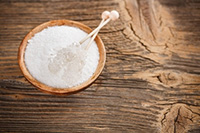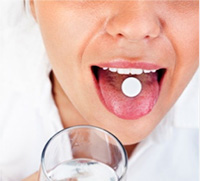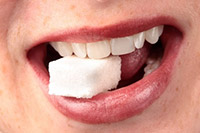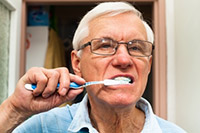Why Does Water Hurt My Teeth? Tooth Sensitivity to Water
February 16th, 2017

Have you ever taken a sip of water and felt a sharp pain in your teeth? This likely means that you have sensitive teeth, and that doing something simple, such as drinking a glass of water, or taking a deep breath through your mouth, can be painful.
So what causes this and how can you fix it?
Tooth Sensitivity
Tooth sensitivity occurs when the protective enamel on our teeth gets thinner, or when our gums recede. There are many reasons why this could be happening:
- You might be brushing your teeth too hard. When you put too much pressure on your teeth while brushing, you can gradually start wearing down the protective layers of your teeth. When this occurs, the tubes or canals that lead to your nerves may become exposed, which can lead to pain or discomfort, especially when eating or drinking something hot or cold. Try using lighter strokes when brushing.
- You could have cavities or loose fillings. Cavities are holes in your teeth that can grow bigger over time. The bigger the hole gets, the more sensitive your teeth can feel. If you think you might have a cavity, or one of your fillings may be loose, make sure to see your dentist right away.
- You’re grinding your teeth. Grinding your teeth can wear down the protective enamel on your teeth, but many people may not even realize that they’re doing it. Oftentimes, people grind their teeth in their sleep.
- You could have a cracked or broken tooth. A cracked or broken tooth can expose the tooth’s nerve, which can cause sensitivity or pain.
- You may have gum disease. Gum disease is caused by plaque, the sticky bacteria that constantly forms on our teeth. If that plaque is not removed with brushing and flossing, it may harden and form “tartar,” which is then very difficult to remove. Teeth sensitivity can be a symptom of gum disease.
- Your mouthwash or toothpaste could be causing it. Some teeth-whitening toothpastes and mouthwashes contain chemicals that your teeth may become sensitive to. Try switching to a mouthwash with less chemicals and a desensitizing toothpaste, such as Sensodyne.
- The foods you’re eating might be too acidic. Excessive consumption of acidic foods or beverages can put your teeth at risk for tooth sensitivity.
Treatments For Sensitive Teeth
If you’re experiencing pain associated with sensitive teeth, there are a number of treatments a dentist can perform that may help, depending on the cause.
- Desensitizing with Gluma is a dental treatment that can help your teeth become less sensitive by stopping by occluding (blocking) the microscopic tubules that compose dentin, thereby preventing the flow of fluid and decreasing sensitivity.
- Gum Disease Treatment Therapy can help treat gum disease, a major contributor of teeth sensitivity, with targeted treatments designed just for you.
- A crown, inlay or bonding can fix a broken tooth or decay that might be causing your teeth to be sensitive. Water Tower Dental Care is proud to offer porcelain crowns in just one visit with CEREC technology.
If you are experiencing tooth sensitivity or have any questions about it, please contact Water Tower Dental Care today.

 Over the years, the use of fluoride in both water and toothpaste has been very controversial. Some people argue that fluoride can cause serious health issues, while experts have found that fluoride can significantly improve dental health. So what’s the truth? Today, we’re going to look at the scientific facts to determine whether fluoride is good or bad for your teeth.
Over the years, the use of fluoride in both water and toothpaste has been very controversial. Some people argue that fluoride can cause serious health issues, while experts have found that fluoride can significantly improve dental health. So what’s the truth? Today, we’re going to look at the scientific facts to determine whether fluoride is good or bad for your teeth. When it’s mixed with something, lemon is one of the most refreshing flavors out there. There’s nothing like sipping on a cold glass of lemonade under the sun, or drinking a cup of hot lemon water on a rainy morning. Unfortunately, your enamel doesn’t think lemon is as tasty as your tastebuds do. In fact, your teeth react to it pretty sourly. Though lemon juice can taste good and has some health benefits, it’s pretty bad for your teeth if it comes into contact with them. Let’s take a look at why now.
When it’s mixed with something, lemon is one of the most refreshing flavors out there. There’s nothing like sipping on a cold glass of lemonade under the sun, or drinking a cup of hot lemon water on a rainy morning. Unfortunately, your enamel doesn’t think lemon is as tasty as your tastebuds do. In fact, your teeth react to it pretty sourly. Though lemon juice can taste good and has some health benefits, it’s pretty bad for your teeth if it comes into contact with them. Let’s take a look at why now. Everyone in Chicago knows that the city’s winter weather can be hard on your commute, skin and nose. But extremely cold weather can also affect your teeth and mouth. Many Chicagoans experience uncomfortable sensations or even extreme pain in their mouth while in icy weather. Let’s take a look at why that happens and what you can do to keep your teeth and mouth feeling great all winter long!
Everyone in Chicago knows that the city’s winter weather can be hard on your commute, skin and nose. But extremely cold weather can also affect your teeth and mouth. Many Chicagoans experience uncomfortable sensations or even extreme pain in their mouth while in icy weather. Let’s take a look at why that happens and what you can do to keep your teeth and mouth feeling great all winter long! We’ve all been there. Eating lunch with a coworker or a friend and getting a big piece of food stuck in our teeth. They may point out that you have something stuck in between your pearly whites and you may quickly work to get it out. Or, even worse, you might notice it afterwards in the mirror and know that they were too hesitant to point it out.
We’ve all been there. Eating lunch with a coworker or a friend and getting a big piece of food stuck in our teeth. They may point out that you have something stuck in between your pearly whites and you may quickly work to get it out. Or, even worse, you might notice it afterwards in the mirror and know that they were too hesitant to point it out. Want to chew gum? Do it! As long as there’s xylitol in it, your dentist will approve. Xylitol is the perfect sugar alternative. Not only does it not cause tooth decay. It’s also good for your teeth. Yes, you heard that right. Something that tastes as wonderful as sugar actually benefits your teeth. Let’s take a look at why.
Want to chew gum? Do it! As long as there’s xylitol in it, your dentist will approve. Xylitol is the perfect sugar alternative. Not only does it not cause tooth decay. It’s also good for your teeth. Yes, you heard that right. Something that tastes as wonderful as sugar actually benefits your teeth. Let’s take a look at why. When it comes to taking care of your teeth, there’s a lot more you can do than just brushing and flossing. In fact, those are just the first two steps to keeping your teeth healthy. Adding oral probiotics to your teeth-cleaning routine will help to ensure that you keep cavities away and an attractive smile going.
When it comes to taking care of your teeth, there’s a lot more you can do than just brushing and flossing. In fact, those are just the first two steps to keeping your teeth healthy. Adding oral probiotics to your teeth-cleaning routine will help to ensure that you keep cavities away and an attractive smile going. Just because you have a particularly hungry sweet tooth doesn’t mean you're doomed to have cavities. There are a handful of sugar and sweetener alternatives out there that aren’t bad for your teeth. In fact, some of these sweet substitutes have actually been found to be good for your teeth. We’re here to let you know which sugar alternatives and sweeteners are best for your teeth.
Just because you have a particularly hungry sweet tooth doesn’t mean you're doomed to have cavities. There are a handful of sugar and sweetener alternatives out there that aren’t bad for your teeth. In fact, some of these sweet substitutes have actually been found to be good for your teeth. We’re here to let you know which sugar alternatives and sweeteners are best for your teeth. Many people think they should brush their teeth right after they eat. At first glance, this seems to make sense. If you brush your teeth after a meal, you should keep your teeth healthy by getting rid of the food in your mouth, right?
Many people think they should brush their teeth right after they eat. At first glance, this seems to make sense. If you brush your teeth after a meal, you should keep your teeth healthy by getting rid of the food in your mouth, right? Balancing work, friends, family, hobbies and relaxation time is hard enough. Trying to find the time to squeeze in a dentist appointment to fix your broken tooth before it gets worse may seem impossible. You need to fix your broken tooth before your nerves are exposed to dangerous bacteria that can cause serious infection, but you can’t seem to find the time to get around to making multiple visits to the dentist. That’s where CEREC One-Visit Crowns come in.
Balancing work, friends, family, hobbies and relaxation time is hard enough. Trying to find the time to squeeze in a dentist appointment to fix your broken tooth before it gets worse may seem impossible. You need to fix your broken tooth before your nerves are exposed to dangerous bacteria that can cause serious infection, but you can’t seem to find the time to get around to making multiple visits to the dentist. That’s where CEREC One-Visit Crowns come in. 
 With long sunny days outdoors and exotic vacations, ‘tis the season for love. And with love comes lots of smooching! When you’re in the moment with your loved one, we’re guessing that you aren’t thinking about how your kisses are affecting your mouth. Interestingly though, kisses really do impact your oral health, both positively and negatively. Our experts are here to tell you how exactly kissing does this with juicy detail. We’ll start with the bad news first.
With long sunny days outdoors and exotic vacations, ‘tis the season for love. And with love comes lots of smooching! When you’re in the moment with your loved one, we’re guessing that you aren’t thinking about how your kisses are affecting your mouth. Interestingly though, kisses really do impact your oral health, both positively and negatively. Our experts are here to tell you how exactly kissing does this with juicy detail. We’ll start with the bad news first. Just as you might expect, as the rest of your body ages, your teeth age as well. So what exactly happens to your teeth as they get older and what can you do now to help them out?
Just as you might expect, as the rest of your body ages, your teeth age as well. So what exactly happens to your teeth as they get older and what can you do now to help them out? You may have heard of the many health benefits of tea, but did you know tea is really good for your teeth as well? Both black and green tea contain catechins, also known as antioxidants, which help remove harmful bacteria from your mouth.
You may have heard of the many health benefits of tea, but did you know tea is really good for your teeth as well? Both black and green tea contain catechins, also known as antioxidants, which help remove harmful bacteria from your mouth.




 Website Powered by Sesame 24-7™
Website Powered by Sesame 24-7™